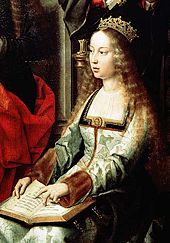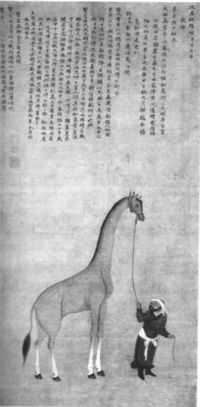15th century
2008/9 Schools Wikipedia Selection. Related subjects: General history
| Millennium: | 2nd millennium |
|---|---|
| Centuries: | 14th century · 15th century · 16th century |
| Decades: | 1400s 1410s 1420s 1430s 1440s 1450s 1460s 1470s 1480s 1490s |
| Categories: | Births – Deaths Establishments – Disestablishments |
As a means of recording the passage of time, the 15th century was the century which lasted from 1401 to 1500.
Events
- 1403: The Settle of the Canary Islands signals the beginning of the Spanish Empire.
- 1402: Ottoman and Timurid Empires fight at the Battle of Ankara resulting in Timur's capture of Bayezid I.
- 1402: Sultanate of Malacca founded by Parameshwara.
- 1403: The Yongle Emperor moves the capital of China from Nanjing to Beijing.
- 1405– 33: Zheng He of China sails through the Indian Ocean to India, Arabia, and East Africa.
- 1410: The Battle of Grunwald was the decisive battle of the Polish-Lithuanian-Teutonic War leading to the downfall of the Teutonic Knights.
- 1410– 13: Foundation of St Andrews University in Scotland
- 1415: Henry the Navigator leads the conquest of Ceuta from the Moors marking the beginning of the Portuguese Empire.
- 1415: Battle of Agincourt fought between the Kingdom of England and France
- 1415: Jan Hus is burned at the stake as a heretic at the Council of Constance.
- 1420: Construction of the Chinese Forbidden City is completed in Beijing.
- 1420– 34: Hussite Wars in Bohemia
- 1424: James I returns to Scotland after being held hostage under three Kings of England since 1406
- 1429: Joan of Arc ends the Siege of Orléans and turns the tide of the Hundred Years' War.
- 1438: Pachacuti founds the Inca Empire.
- 1440s: The Golden Horde breaks up into the Siberia Khanate, the Khanate of Kazan, the Astrakhan Khanate, the Crimean Khanate, and the Great Horde.
- 1440– 69: Under Moctezuma I, the Aztecs become the dominant power in Mesoamerica.
- 1441: Portuguese navigators cruise West Africa and reestablish the European slave trade with a shipment of African slaves sent directly from Africa to Portugal.
- 1441: Eton College founded by Henry IV.
- 1444: The Albanian league is established in Lezha, Skanderbeg is elected leader
- 1444: Ottoman Empire under Sultan Murad II defeats the Polish and Hungarian armies under Władysław III of Poland and János Hunyadi at the Battle of Varna.
- 1445: Kazan Khanate defeats Grand Duchy of Moscow at the Battle of Suzdal
- 1446: King Sejong the Great published a hangul, the native phonetic alphabet system for the Korean language.
- 1449: Esen Tayisi leads an Oirat Mongol invasion of China which culminate in the capture of the Zhengtong Emperor at Battle of Tumu Fortress.
- 1453: The Fall of Constantinople marks the end of the Byzantine Empire and the beginning of the Growth of the Ottoman Empire.
- 1453: The Battle of Castillon is the last engagement of the Hundred Years' War.
- 1454– 66: After defeating the Teutonic Knights in the Thirteen Years' War, Poland annexes Royal Prussia.
- 1455– 85: Wars of the Roses - English civil war between the House of York and the House of Lancaster.
- 1456: The Siege of Belgrade halts the Ottoman's advance into Europe.
- 1462: Sonni Ali Ber, the ruler of the Songhai (or Songhay) Empire, along the Niger River, conquered Mali in the central Sudan by defeating the Tuareg contingent at Tombouctou (or Timbuktu) and capturing the city. He developed both his own capital, Gao, and the main centres of Mali, Timbuktu and Djenné, into major cities. Ali Ber controlled trade along the Niger River with a navy of war vessels.
- 1462: Mehmed the Conqueror is driven back by Wallachian prince Vlad III Dracula at the Night Attack.
- 1467: Uzun Hasan defeats the Black Sheep Turkoman leader Jahān Shāh.
- 1467– 1615: The Sengoku period is one of civil war in Japan.
- 1469: The marriage of Ferdinand II of Aragon and Isabella of Castile leads to the unification of Spain.
- 1469: Birth of Guru Nanak Dev. Beside followers of Sikhism, Guru Nanak is revered by Hindus and Muslim Sufis across the Indian subcontinent.
- 1471: The kingdom of Champa suffers a massive defeat by the Vietnamese king Lê Thánh Tông.
- 1474– 77: Burgundy Wars of France, Switzerland, Lorraine and Sigismund II of Habsburg against the Charles the Bold, Duke of Burgundy.
- 1478: Muscovy conquers Novgorod.
- 1480: After the Great standing on the Ugra river, Muscovy gained independence from the Great Horde.
- 1481: Spanish Inquisition begins in practise with the first auto de fe.
- 1485: Henry VII defeats Richard III at the Battle of Bosworth and becomes King of England
- 1492: The death of Sunni Ali Ber left a leadership void in the Songhai Empire, and his son was soon dethroned by Mamadou Toure who ascended the throne in 1492 under the name Askia (meaning "general") Muhammad. Askia Muhammad made Songhai the largest empire in the history of West Africa. The empire went into decline, however, after 1528, when the now-blind Askia Muhammad was dethroned by his son, Askia Musa.
- 1492: Boabdil's surrender of Granada marks the end of the Reconquista and Al-Andalus.
- 1492: Jews expelled from Spain.
- 1492: Christopher Columbus founds Spain's first New World colony on Hispaniola.
- 1494: Spain and Portugal sign the Treaty of Tordesillas and agree to divide the World outside of Europe between themselves.
- 1494– 1559: The Italian Wars lead to the downfall of the Italian city-states.
- 1497– 1499: Vasco da Gama's first voyage from Europe to India and back.
- 1499: Ottoman fleet defeats Venetians at the Battle of Zonchio.
Significant people
- Abu Sa'id al-Afif, a Samaritan physician.

Isabella of Castile helped unify Spain via a dynastic marriage with Ferdinand of Aragon in 1469.
- Christine de Pizan, French writer ( 1364– 1430).
- Jan Hus, Bohemian religious thinker and reformer (c. 1369– 1415).
- Zheng He, Chinese eunuch admiral and explorer ( 1371– 1433).
- Filippo Brunelleschi invents one-point perspective, leads innovation in Italian architecture ( 1377– 1446).
- Henry V of England, the English King who won the famous Battle of Agincourt in 1415 ( 1387– 1422).
- John Hunyadi, Regent of Kingdom of Hungary, won the Siege of Belgrade in 1456 ( 1387– 1456)
- Sejong the Great of Joseon, a Korean monarch who developed hangul, the native Korean alphabet ( 1397– 1450).
- Johannes Gutenberg, European inventor of printing with movable type (c. 1398– 1468)
- Stephen III of Moldavia, also known as Stephen the Great, ruler of Moldavia, national hero of Romanians for long resistance to the Ottomans ( 1437– 1504)
- Constantine XI, Last Byzantine Emperor ( 1404– 1453).
- Guru Nanak, founder of the Sikh Religion ( 1469 ).
- Johannes Ockeghem, Flemish composer (ca. 1410– 1497).
- Joan of Arc, national heroine of France ( 1412– 1431).
- Louis XI, King of France ( 1423– 1483).
- Kazimierz IV Jagiellon King of Poland and Grand Duke of Lithuania ( 1427– 1492).
- François Villon, French poet (c. 1431– 1474).
- Vlad III Dracula, Prince of Wallachia who led the defense of his territory against the expanding Ottoman Empire ( 1431– 1476).
- Mehmed II, Sultan of the Ottoman Empire and Conqueror of Constantinople ( 1432– 1481).
- Mir Chakar Khan Rind ( 1468– 1565)

An African giraffe being led into a Ming Dynasty zoo, a Chinese painting by She Du, 1414 AD, during the reign of the Yongle Emperor.
- Marsilio Ficino, Significant translator of Plato's works ( 1433– 1481).
- Gjergj Kastrioti, Skenderbeg - Albanian Prince who resisted the Ottomans for almost 30 years in the name of the Albanian people and Catholic faith ( 1443– 1468).
- Matthias Corvinus of Hungary, Renaissance ruler ( 1443– 1490).
- Isabella of Castile, co-ruler of Ferdinand II of Aragon and responsible with him for the unification of Spain ( 1451– 1504).
- Christopher Columbus sails to the Americas for Spain (c. 1451– 1506).
- Richard III of England, last English King of the House of York, last of the House of Plantagenet ( 1452– 1485).
- Ferdinand II of Aragon, co-ruler of Isabella of Castile and responsible with her for the unification of Spain ( 1452– 1516).
- Leonardo da Vinci, inventor and painter ( 1452– 1519).
- Henry VII of England, English King and founder the Tudor dynasty ( 1457– 1509).
- Vasco da Gama reaches India for Portugal, creating the first maritime alternative for the Silk Road (c. 1469– 1524
Inventions, discoveries, introductions
List of 15th century inventions
- Renaissance affects philosophy, science and art.
- Age of Discovery begins.
- Rise of Modern English language from Middle English.
- Introduction of the noon bell in the Catholic world.
- Public banks
- Yongle Encyclopedia—over 22,000 volumes
- Hangul alphabet in Korea
- Scotch whisky
- Psychiatric hospitals
- Development of the woodcut for printing between 1400–1450
- Movable type first used by King Taejong of Joseon—1403 (Movable type, which allowed individual characters to be arranged to form words, was invented in China by Bi Sheng between 1041 to 1048.)
- Although pioneered earlier in Korea and by the Chinese official Wang Zhen (with tin), bronze metal movable type printing is created in China by Hua Sui in 1490.
- Johannes Gutenberg invents the printing press in Europe (c. 1455).
- Linear perspective drawing perfected by Filippo Brunelleschi 1410–1415
- Invention of the harpsichord c. 1450
- Colonization of America by Christopher Columbus 1492
- First canal lock reportedly built in Vreeswijk, Netherlands in 1481
Decades and years
|
|||||||||||||||||||||||||||||||||||||||||||||||||||||||||||||||||||||||||||||||||||||||||||||||||||||||||||||||||||||||||||||||||||||||||
|
|||||||||||||||||||||||||||||||||||||||||||||||||||||||||||||||||||||||||||||||||||||||||||||||||||||||||||||||||||||


